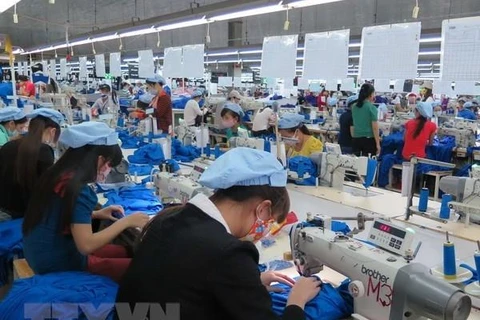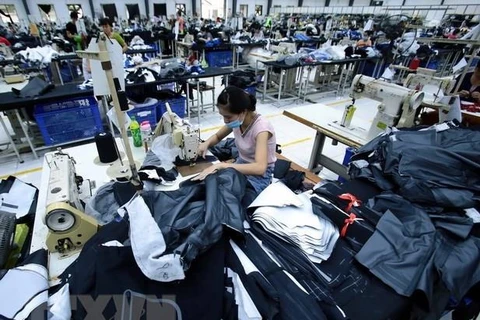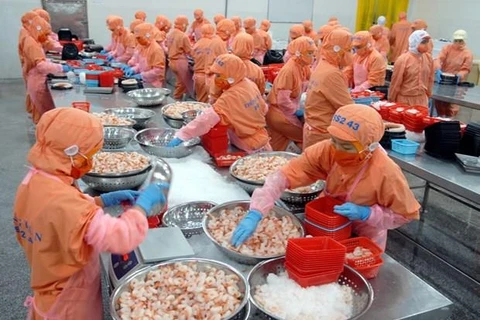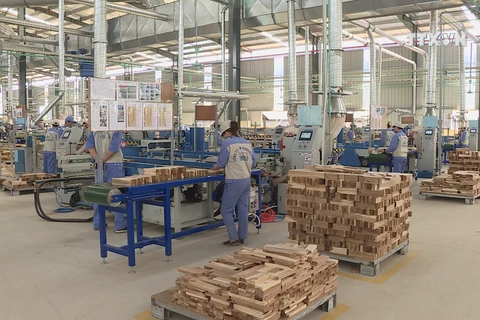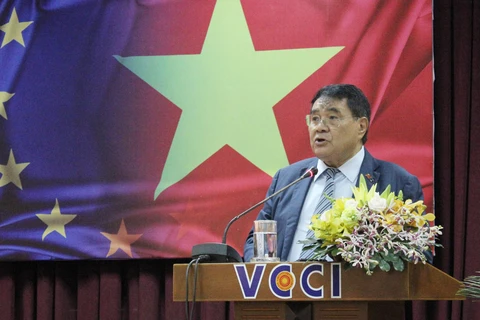 Minister of Industry and Trade Tran Tuan Anh (R) and Minister of Agriculture and Rural Development Nguyen Xuan Cuong (C) at the conference on the EVFTA held in Ho Chi Minh City on August 21 (Photo: VNA)
Minister of Industry and Trade Tran Tuan Anh (R) and Minister of Agriculture and Rural Development Nguyen Xuan Cuong (C) at the conference on the EVFTA held in Ho Chi Minh City on August 21 (Photo: VNA) HCM City (VNA) – Overcoming tariff barriers doesn’t mean Vietnamese good and services can easily enter the European Union (EU), but they still have to satisfy strict non-tariff requirements of what is one of the world’s most demanding markets, according to Minister of Industry and Trade Tran Tuan Anh.
The EU-Vietnam Free Trade Agreement (EVFTA) was signed in Hanoi on June 30. Once taking effect, it will eliminate 99 percent of the import tariff lines between the two sides in 7-10 years. This is the highest commitment level Vietnam has received among the FTAs it has inked.
Notably, many commodities will benefit from the zero-percent tariffs immediately after the deal becomes effective such as coffee, peppercorn, honey and aquatic products.
At a conference in Ho Chi Minh City on August 21, Minister of Agriculture and Rural Development Nguyen Xuan Cuong said agricultural products of Vietnam have been shipped to 185 countries and territories, including big markets like the US, Japan, the EU and the Republic of Korea. The EVFTA is hoped to help Vietnam strongly boost the shift of export to Europe.
Echoing this, Minister Anh said under the pact, Vietnam’s exports to the EU can rise by some 20 percent in 2020, 42.7 percent in 2025 and 44.37 percent in 2030, compared to the pre-EVFTA period. At the same time, imports from the EU will also increase but at a slower pace.
The EVFTA will help raise the country’s GDP by 2.18-3.25 percent by 2023 and 7.07-7.72 percent by 2033 on average.
It will expand the market for Vietnam’s strong produce like agricultural and aquatic products, facilitating their access to the market that groups 28 member countries with more than 500 million people and reducing its dependence on the Chinese and Southeast Asian markets, he noted.
Pointing out non-tariff challenges, Anh said the EU has many requirements relevant to not only quality but also production process. For example, manufacturers must not use seafood caught illegally or illegal timber. They also have to meet food safety, labour and environmental standards which are among the most stringent of their kinds in the world.
To capitalise on benefits generated by the EVFTA, businesses, especially small- and medium-sized ones, should actively acquire information to realise opportunities and challenges and take actions to improve their products and enhance competitiveness, according to the official.
Talking about ways to make use of the trade deal, Minister Cuong said his sector will work to step up agricultural processing and the export of vegetables, fruits, aquatic products, timber and wood products. It will facilitate expanding the size and boosting the competitiveness of domestic farms, encourage production under value chains, and strictly control the use of chemicals in agricultural practices.
To promote farm produce’s value, Vietnam needs to attract foreign investment to high technology application and the industries supporting agricultural production. Helping local firms better competitiveness and develop distribution channels in the domestic market, and preparing trade remedies for Vietnamese farm produce before the EVFTA is enforced are also measures to be taken in the time ahead, he added. -VNA
VNA
